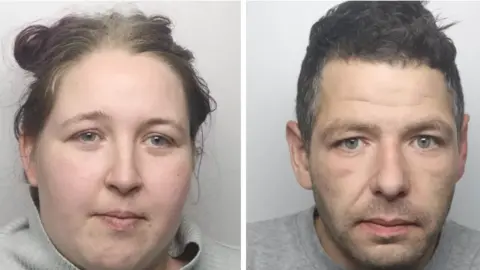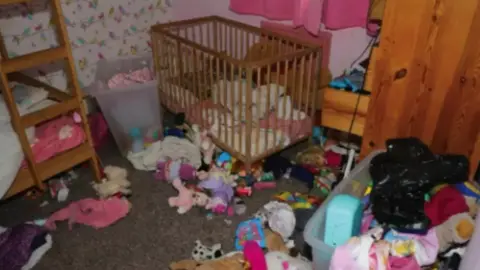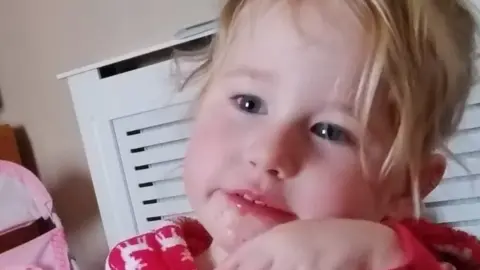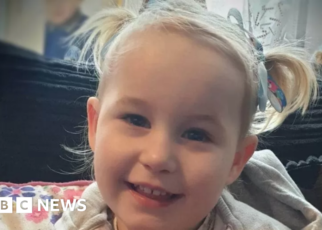[ad_1]
There were “missed opportunities” to intervene before a toddler was murdered by her mother’s boyfriend, a review has found.
Children’s services at Pembrokeshire council were “overstretched and morale was low” prior to the death of two-year-old Lola James, a child practice review said.
The toddler died from “catastrophic” brain injuries in July 2020 after being attacked by Kyle Bevan at the family home.
Pembrokeshire council said its safeguarding duties were taken “extremely seriously” and had developed an action plan.
A Welsh government spokesperson said itwould “carefully consider the learning identified by the review and ensure this is driven forward”.
Such a review is held when abuse or neglect is known or suspected and the child dies or suffers serious harm.
It looks at the role of a number of agencies and bodies.
Kyle Bevan, 31, was jailed for life in April 2023 for Lola’s murder, while her mother Sinead James, 30, was sentenced to six years for causing or allowing her daughter’s death at her home in Haverfordwest.
Lola was left with 101 injuries on her body and Bevan tried to convince the jury she had fallen down the stairs after tripping over the family dog.
The report, commissioned by Cysur, the safeguarding board for mid and west Wales, covered the 17-month period leading up to her death.
 Dyfed-Powys Police
Dyfed-Powys PoliceIt outlined seven “learning points” for the agencies involved and 11 action points.
An assessment of Lola by children’s services in March 2020 “lacked detail and analysis”, partly because her social worker was off sick.
The team leader acknowledged the assessment team was “struggling under the pressure of the relentless workload”.
The last home visit by a health visitor was on 15 February 2020, five-and-a-half months before her murder.
Sinead James repeatedly declined requests for visits, including two days before Lola’s murder, when she instead had a phone call with the team.
Welsh government guidance at the time stated health visitors should prioritise face-to-face contact for vulnerable families with safeguarding concerns, but the report said James’s decision “was not challenged or probed” by the health visitor.
Independent reviewer Emma Sutton concluded the health visitor could have taken “further steps to seek agreement for a home visit”, calling it a “missed opportunity”.
A home visit may have revealed “concerning home conditions” and been an opportunity to see if Bevan was living at there.
Hywel Dda health board said during the review that a health visitor at the time had an average caseload of 250 children and there were significant staff shortages and sickness due to Covid.
 Crown Prosecution Service
Crown Prosecution ServiceThere was also a lack of “information sharing” between agencies.
Lola’s older sister told her teacher about home life, but there was no “ability to share sibling information between the respective educational settings”.
Bevan was known to the police after domestic incidents relating to his mum, as well as substance misuse.
He made a report to police in June 2020 that a threatening letter had been delivered to him at James’s home and Dyfed-Powys Police knew three young children were living there, but the “dots were not joined by police” and a referral was not made to social services.
Ms Sutton said it was vital there were “adequate staffing levels and resources” and the children’s services assessment team was able to “respond to and fulfil safeguarding responsibilities” going forward.
The report said several requests were made for more resources to be allocated for several years, “including for the recruitment and retention of social workers”.
 Family photo
Family photoBut it added the situation was now “more positive”, with an extra £611,640 made available during June and July 2024.
It suggested professionals should be supported in asking “probing questions of families” and not simply accept what is being said.
Police should also establish a “flagging mechanism” for specific addresses where there is a wider history of safeguarding concerns.
Cysur said it hoped the report would “contribute to wider ongoing learning and improvement in relation to a number of key safeguarding issues across all agencies with safeguarding responsibilities”.
The council’s cabinet member for social care, Tessa Hodgson, said safeguarding was the authority’s “key priority” and an action plan had been developed to deal with the issues in the review.
A Welsh government spokesperson said: “A single unified safeguarding review system is being developed which will ensure the findings from all child and adult practice reviews are captured, shared and acted upon.
“We are also developing a national practice framework to promote best practice and raise practice standards across services for children in Wales.
“Extensive work to transform children’s services is ongoing and we have been clear that now is the time for action and not further review.”
[ad_2]
Source link freeslots dinogame telegram营销




